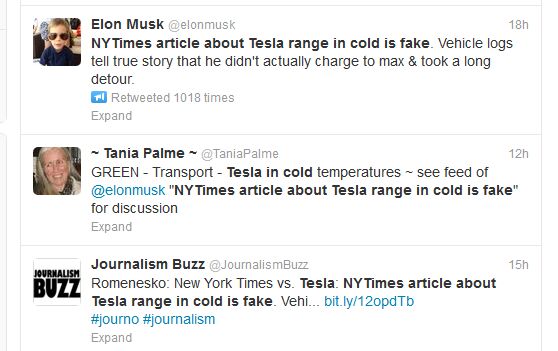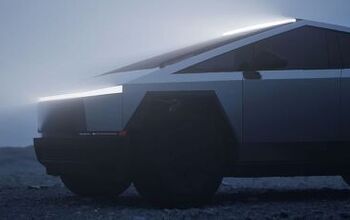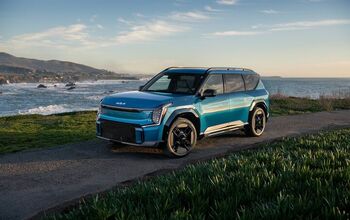After Tesla Stalls, Musk Calls NY Times Report A Fake

Tow truck delivers Model S to charging station
New York Times reporter John Broder told a harrowing story of a test drive from Delaware to Connecticut in a Tesla-supplied Model S. Broder wanted to review both the car and Tesla’s Supercharger stations along I95. The drive ended on a flatbed truck with a Model S that had run out of juice. The story landed Broder on Elon Musk’s shitlist.
“NYTimes article about Tesla range in cold is fake. Vehicle logs tell true story that he didn’t actually charge to max & took a long detour,” Musk tweeted, and the Tweet was re-tweeted more than a thousand times.
New York Times spokeswoman Eileen Murphy told Reuters that the article about Broder’s test drive “was completely factual, describing the trip in detail exactly as it occurred. Any suggestion that the account was ‘fake’ is, of course, flatly untrue.”
The report, which is required reading for both EV lovers and haters, is big on suspense. After an uneventful drive from Washington D C, it gets interesting after a 49 minute stop at the first Supercharger. Only after turning the heat to low, and later to off, Broder limps into the next Supercharger station with “Recharge Now” flashing in red.
Broder is going north, and it is getting cold. The Model S does not like it. After a night parked in Connecticut, two thirds of the available range are gone. Even after an emergency charge on the way, the battery is exhausted and the car shuts down. A tow truck is called. There are problems getting the car on the flatbed because an “electrically actuated parking brake would not release without battery power.”
Broder documents everything in great detail, along with many calls to Tesla, all the way up to Tesla’s chief technology officer, J B Straubel.
The New York Times spokeswoman said Broder “followed the instructions he was given in multiple conversations with Tesla personnel,” and “there was no unreported detour,” as Musk claims.

Bertel Schmitt comes back to journalism after taking a 35 year break in advertising and marketing. He ran and owned advertising agencies in Duesseldorf, Germany, and New York City. Volkswagen A.G. was Bertel's most important corporate account. Schmitt's advertising and marketing career touched many corners of the industry with a special focus on automotive products and services. Since 2004, he lives in Japan and China with his wife <a href="http://www.tomokoandbertel.com"> Tomoko </a>. Bertel Schmitt is a founding board member of the <a href="http://www.offshoresuperseries.com"> Offshore Super Series </a>, an American offshore powerboat racing organization. He is co-owner of the racing team Typhoon.
More by Bertel Schmitt
Latest Car Reviews
Read moreLatest Product Reviews
Read moreRecent Comments
- Ajla My understanding is that the 5 and 7-Series cater almost exclusively to the Chinese market and they sell them here just so they don't look weak against Mercedes and Audi.
- EBFlex Interesting. We are told there is insatiable demand for EVs yet here is another major manufacturer pivoting away from EV manufacturing and going to hybrid. Did these manufacturers finally realize that the government lied to them and that consumers really don’t want EVs?
- Kwik_Shift_Pro4X What's worse than a Malibu?
- MaintenanceCosts The current Malibu is poorly packaged; there's far more room inside a Camry or Accord, even though the exterior footprint is similar. It doesn't have any standout attributes to balance out the poor packaging. I won't miss it. But it is regrettable that none of our US-based carmakers will be selling an ordinary sedan in their home market.
- Jkross22 You can tell these companies are phoning these big sedans in. Tech isn't luxury. Hard to figure out isn't luxury.This looks terrible, there are a lot of screens, there's a lot to get used to and it's not that powerful. BMW gave up on this car along time ago. The nesting doll approach used to work when all of their cars were phenomenal. It doesn't work when there's nothing to aspire to with this brand, which is where they are today. Just had seen an A8 - prior generation before the current. What a sharp looking car. I didn't like how they drove, but they were beautifully designed. The current LS is a dog. The new A8 is ok, but the interior is a disaster, the Mercedes is peak gaudy and arguably Genesis gets closest to what these all should be, although it's no looker either.



































Comments
Join the conversation
And now the NYT has their latest response: http://wheels.blogs.nytimes.com/2013/02/14/that-tesla-data-what-it-says-and-what-it-doesnt/
If you ride a bus for ten miles, you better plan on waiting a while at the station to catch the right bus back home. If you pedal a bicycle for 10 miles you better think about how tired you will feel before you have to pedal 10 miles back. If you ride a motorcycle 10 miles you better think about whether it will be too cold or rainy for you to safely ride 10 miles back. Similar planning applies to EVs. It seems to me that we have gotten spoiled by the idea that we should be able to go anywhere on a whim and get there at 75mph. If that's your reference point, you probably shouldn't buy an EV. But if you are used to things like buses, taxis, trains, bicycles, motorcycles, and you consider an EV in that context, you can think about the advantages and disadvantages and decide if it works for your situation. If, like me, you almost never drive more than 40 miles in one day, and you're willing to make other arrangements on those rare occasions that you need to go farther, such as taking the bus or renting an ICE car, then an EV might work for you.